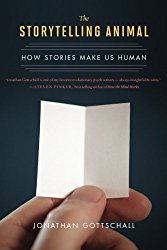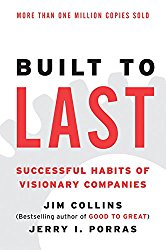
When I look back at the end of my life, I hope the relationships formed with colleagues are among those I cherish as true and lasting. Sure, nobody ever said they wished they had worked more, but work we must. Even while doing mundane tasks, I believe we can each find meaning and higher purpose. Indeed, the time we spend making a living is not separate from life. It is life. And a big chunk at that.
I truly love my colleagues and clients. Is that a funny word to use in the context of employment? I don’t think so. I believe my colleagues and customers deserve my genuine love and that my work is deserving of devotion. This is an opportunity I might make a small difference with the time I spend on this planet.
I also believe story is a powerful way to accomplish these purposes. As a biographer, I witness the tremendous power of story to bring families and organizations together. In this article, I share reasons why you should begin telling your own business stories with that same heart. It matters.
Of all you do at work, sharing business stories may have the most profound impact
This claim is not hyperbole, the compelling nature of story is rooted in human psychology and even biology. Stories engage and inspire us. In short, if you want to teach and lift others, this is one of your best tools. If you want to leave a legacy, start telling better business stories now. You don’t have to be a polished storyteller to make a difference, what does matter is to be on the lookout for powerful stories you can share with heart.
 Humans are storytelling animals
Humans are storytelling animals
Humans are storytelling animals. The science and biology behind this are covered in the insightful book The Storytelling Animal) which explains how since the dawn of time we have been passing our values to new generations through stories told around the fire. The need to tell stories is hard-wired into our DNA. This is as core to our humanity as our ability to think and as important to our growth as a species as any other trait. Today we all crave stories in movies, on television, from books and in role-playing video games. Children’s play largely consists of acting out stories. When we stare off into space, our minds create fantasies. When we go to sleep, our brains are making up stories. Today, we are not tribes telling tales around the fire, but we still swap tales in the break room (gossip, anyone?) and we share little vignettes in team meetings (read my related story on how to get started). Stories remain the primary way humans convey culture, how we socialize children and newcomers, and the truest method for communicate the organization’s real values, not just the published ones. The collective power of story in organizations is illustrated in the great business books of our day.
 The best companies have almost cult-like culture – business stories are a big part of that
The best companies have almost cult-like culture – business stories are a big part of that
Let’s talk about two relevant takeaways from two business classics: Built to Last and Good to Great, by Jim Collins and friends. I re-read these every few years and dusted them off in which I dusted off and re-read in preparation for this article. A common thread in best-of-class Built to Last companies was that they all had strong cultures that Collins describes as bordering on “cult-like.” These organizations have crystal-clear shared core values that employees stick to with religious zeal. One way this culture is introduced and reinforced with each fresh batch of recruits is to tell the organization’s lore. Classic tales get repeated and guide future action.
“He heard dozens of stories about heroic customer service: the Nordie who ironed a new-bought shirt for a customer who needed it for a meeting that afternoon; the Nordie who cheerfully gift wrapped products a customer bought at Macy’s; the Nordie who warmed customers’ cars in winter while the customers finished shoppping, the Nordie who personally knotted a shawl for an elderly customer who needed one of a special length that wouldn’t get caught in the spokes of her wheelchair; the Nordie who made a last-minute delivery of party clothes to a frantic hostess; and even the Nordie who refunded money for a set of tire chains—even though Nordstrom doesn’t sell tire chains.” (Built to Last p. 118 copyright 2002).
In Good to Great, one of the biggest surprises the researchers discovered is that people are NOT your most important asset. (Pause for effect). The RIGHT people are. The companies that made the leap from merely good to become great figured out the traits that made exceptional employees, and they hired that kind of person.
Stories make the institution’s mission tangible. We can put pretty words on a wall, but example speaks. In 1960 Senator John F. Kennedy said at a Q&A session at the Mormon Tabernacle in Salt Lake City, “What we are speaks louder than what we say.” Stories provide authentic examples of what we are, not just what we say.
Related: How to write a life story – advice from a Hollywood journalist
Stories convey the heart of your why
In one of the most viewed Ted Talks of all time, Simon Sinek who wrote the book, “Start with Why,” explains that customers don’t care what you do, they care why you do it. They don’t connect to your product, they connect to what you believe. Martin Luther King Junior filled the National Mall with people who believed what he believed. King did not deliver the “I have a plan” speech. If you have never seen this Ted Talk, your life will be better for the 18 minutes you spend here. Trust me on this one. Here is the link.
Go beyond the sort of rah-rah testimonials designed to sell product. Remember also thee cardinal rule: It’s not about you! It’s about the reader/listener/viewer. What does the viewer or listener get in exchange for giving you their undivided attention? Viewers want to be entertained. They want to learn something new, and most of all, they want to feel. They are ready for you to inspire them. They want to hear a story, even business stories.
Why curate your own canon of business stories
Referring back to the idea that Built to Last companies hold to their values with religious zeal, let’s consider that the Bible is an anthology of epic stories, one right after the other. These stories began as oral history and passed the test of time, teaching important principles to new generations. It is yet another example of how story is the method of choice for teaching our children, our tribes, and our families.
Today great leaders use business stories to inspire action in employees. My whole goal with this article is to encourage you to thin about stories you can share right away. Begin curating your own canon of the best stories to illustrate your unique values. Be intentional about it and grow your repertoire over time. Watch for fresh stories you can share with team members, customers and even your boss when the opportunity arises. Stories collected now might someday become organizational lore, a bible of great tales. It will transform your career. I would bet my own future on this claim.
Related: Become a business storyteller by asking these 5 questions
Business stories inspire the 3rd generation of my family’s business
 One more personal story before I wrap up. When my mom and I began writing her life story about the family business she and my dad started in 1969, I had no idea the impact it would have on the family. We simply felt a purpose at the time.
One more personal story before I wrap up. When my mom and I began writing her life story about the family business she and my dad started in 1969, I had no idea the impact it would have on the family. We simply felt a purpose at the time.
But the stories we stitched into a full book (Every Essential Element) now provide a roadmap for future our family and employees. A nephew who does not work in the business told me that he had never heard most of the it, and the book made him feel, “proud to be an Anderson. I received letters from customers all over the world telling me how my parents inspired them. When we began, I couldn’t know that one day I would have a child who would only know my dad and his values through the stories we tell about him. That book is my best gift to her.
Finally, my parents’ values have a profound impact on who I strive to become. Their example gives me courage. When the time came for me to make a terrifying decision to quit my day job and start Evalogue.Life, the faith my parents showed gave me the guts to leap. It has been one of the best decisions of my life and I can’t imagine what I would be missing out on if I had been immobilized by fear.
Related: Finding a letter from my dad 9 years after his death
Of all the skills you might hone at work, consider adding the goal of becoming a competent business storyteller. For reasons why, read this related article on the power of telling business stories. This article, however, focuses on five question prompts that will help you identify experiences you can begin sharing with heart, right away.
Every business storyteller’s repertoire should include 5 these themes
Related article: read this full article with examples of these 5 types of business stories
What is the greatest lesson your mentor taught?
Tell me about a time someone did the right thing.
When did your product or service make the difference?
Tell me about a time you didn’t know if you would make it.
How did you start in business?

Rhonda Lauritzen is the founder and an author at Evalogue.Life – Tell Your Story. Rhonda lives to hear and write about people’s lives. She believes that when you tell your story, it changes the ending., She and her husband Milan restored an 1890 Victorian in Ogden. She especially enjoys unplugging in nature. Check out her books: How to Storyboard, and Every Essential Element. Most recently she was the writing coach of bestselling author, Rob A. Gentile, who wrote Quarks of Light, A Near-Death Experience: What I Saw That Opened My Heart
Disclaimer: This page contains affiliate links which means if you purchase some of the products we mention by using our links, we make a commission. Be assured that I’m only sharing the methods I actually use, but I do appreciate when you buy with my links because it helps fund articles like this one.



Pingback: New book - Remember When - shows truth is better than fiction - Evalogue.Life - Tell Your Story
Pingback: The Power of Story - Evalogue.Life - Tell Your Story
you are right on!
Aw, thanks Devon! I appreciate you taking a minute to comment. I’d love to hear more of your thoughts.